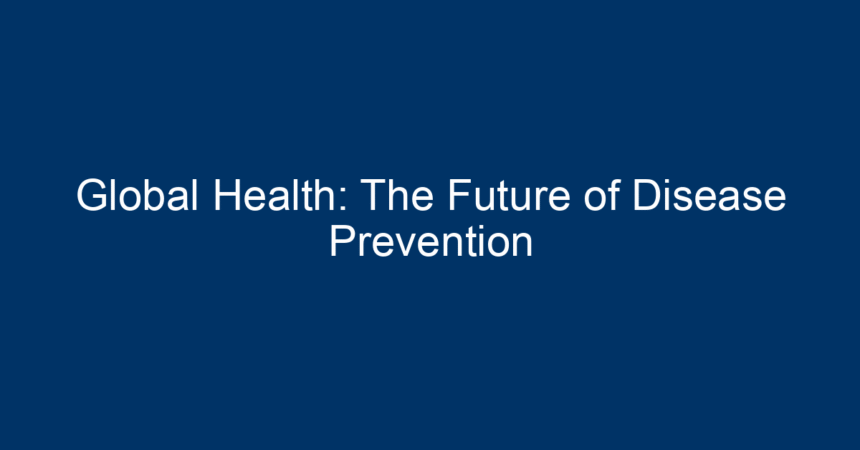In an increasingly interconnected world, global health stands at the forefront of discussions surrounding disease prevention. The COVID-19 pandemic served as a stark reminder of our vulnerabilities, but it also highlighted the power of collaboration and innovation in global health initiatives. As we move forward, understanding how to effectively prevent diseases on a global scale is crucial for safeguarding the health of future generations.
Understanding Global Health
Global health encompasses the health of populations in a worldwide context and involves international efforts to improve health and achieve health equity. This field recognizes that many health issues cross borders and require coordinated responses. From infectious diseases to chronic illnesses, global health aims to implement strategies that reduce disease incidence and improve the overall well-being of communities.
Key Components of Global Health
-
International Collaboration
Global health thrives on collaborative efforts among nations, health organizations, and communities. The World Health Organization (WHO) plays a pivotal role in facilitating these collaborations by providing guidelines, resources, and expertise. -
Research and Innovation
Advancements in medical research and technology are instrumental in understanding and preventing diseases. Innovations such as telemedicine, AI diagnostics, and vaccine development are transforming how we approach disease prevention. - Health Equity
Addressing disparities in healthcare access and outcomes is fundamental to global health. Vulnerable populations often bear a disproportionate burden of preventable diseases, making equity a central focus of global health initiatives.
The Role of Technology in Disease Prevention
Telemedicine: Bridging the Gap
Telemedicine has emerged as a key player in enhancing global health, making healthcare accessible to underserved populations. Remote consultations and digital health services have broken down geographical barriers, allowing individuals in remote or impoverished areas to receive timely medical care. This proactive approach not only streamlines diagnostics but also facilitates immediate intervention, significantly reducing disease prevalence.
Artificial Intelligence in Diagnostics
Artificial Intelligence (AI) is revolutionizing how we detect and diagnose diseases. Machine learning algorithms analyze vast amounts of health data to identify patterns that might go unnoticed by human practitioners. Early detection of diseases such as diabetes, heart disease, and various cancers can lead to timely interventions and prevent complications. The ability to predict outbreaks by analyzing health trends can significantly bolster global health efforts.
Data Analytics for Disease Surveillance
The rise of data analytics has transformed disease surveillance, allowing health organizations to monitor and respond to outbreaks in real-time. With tools that analyze social media trends, mobility patterns, and epidemiological data, public health officials can make informed decisions faster than ever. This capability is vital in preventing the spread of infectious diseases and ensuring that preventative measures are implemented in a timely manner.
The Impact of Climate Change on Global Health
Increased Disease Incidence
Climate change poses a serious threat to global health as it affects weather patterns, air and water quality, and biodiversity. Rising temperatures can lead to the emergence of vector-borne diseases such as malaria and dengue fever in regions previously unaffected. As we witness more extreme weather events, health systems must adapt to manage the resulting public health crises.
Adaptation Strategies
To mitigate these risks, global health strategies must include robust adaptation plans. This involves integrating climate considerations into public health policies, investing in infrastructure resilient to climate changes, and promoting sustainable practices. Education and awareness campaigns about the health implications of climate change are necessary to empower communities.
Vaccine Development and Disease Prevention
The Race for Vaccines
The rapid development of COVID-19 vaccines showcased the potential of scientific innovation in global health. Collaborative efforts between governments, pharmaceutical companies, and research institutions led to unprecedented results. This experience should drive future vaccine development, emphasizing the importance of preparedness and investment in research.
Expanding Vaccine Access
Ensuring equitable access to vaccines is a pressing challenge. Initiatives like COVAX aim to provide vaccines to low- and middle-income countries, thereby improving global health equity. Future efforts should focus on reducing the logistical and financial barriers to vaccine distribution and encouraging local production capabilities.
Education and Awareness: A Cornerstone of Prevention
Promoting Healthy Behaviors
Education plays a crucial role in disease prevention. Public health campaigns aimed at promoting healthy lifestyles, such as proper nutrition and physical activity, can significantly reduce the risk of chronic diseases. Schools, community centers, and workplaces are ideal venues for disseminating health information.
Empowering Communities
Empowering communities to take charge of their health can lead to more sustainable outcomes. Community health workers can bridge cultural gaps and engage residents in health-promoting activities. Their firsthand knowledge of community dynamics makes them valuable assets in global health initiatives.
Conclusion: The Path Forward
As we envision the future of disease prevention in the realm of global health, it is imperative to adopt a multifaceted approach. By leveraging technology, fostering international cooperation, addressing climate challenges, and promoting education, we can create a world where diseases are effectively prevented and managed.
Actionable Insights for Individuals and Communities
-
Stay Informed
Keep up with global health news and developments to understand the shifting landscape of disease prevention. -
Support Local Health Initiatives
Participate in community health programs and support organizations that promote equitable healthcare access. -
Advocate for Climate Action
Understand the connections between climate change and health, advocating for policies that protect both our environment and our health. - Enhance Personal Health Practices
Embrace healthy lifestyle choices and educate others about the importance of preventive measures.
By taking these steps, individuals and communities can contribute to the broader goals of global health, shaping a healthier future for all. The journey toward effective disease prevention is collaborative, and together, we can make a meaningful impact. The future of global health depends on our collective efforts today.




